|
|
|
Sort Order |
|
|
|
Items / Page
|
|
|
|
|
|
|
| Srl | Item |
| 1 |
ID:
095062
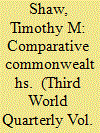

|
|
|
|
|
| Publication |
2010.
|
| Summary/Abstract |
The distinctive contributions of the several Commonwealths- inter- and non-state-to global development and governance have been overlooked for too long. The four treated here continue to advance multilateralism and public diplomacy, having earlier contributed to the decolonisation of countries and communities. The anglophone Commonwealth was especially active in support of the liberation movements in Southern Africa, leading to South Africa's transition to a non-racial democracy and return to the Commonwealth in the early 1990s. Commonwealths' norms and values remain relevant in the second decade of the 21st century, symbolised by Rwanda's late 2009 admission to the anglophone family.
|
|
|
|
|
|
|
|
|
|
|
|
|
|
|
|
| 2 |
ID:
095057
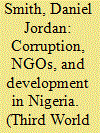

|
|
|
|
|
| Publication |
2010.
|
| Summary/Abstract |
This article examines corruption in Nigeria's development sector, particularly in the vastly growing arena of local non-governmental organisations (NGOs). Grounded in ethnographic case studies, the analysis explores why local NGOs in Nigeria have proliferated so widely, what they do in practice, what effects they have beyond their stated aims, and how they are perceived and experienced by ordinary Nigerians. It shows that even faux NGOs and disingenuous political rhetoric about civil society, democracy, and development are contributing to changing ideals and rising expectations in these same domains.
|
|
|
|
|
|
|
|
|
|
|
|
|
|
|
|
| 3 |
ID:
095056
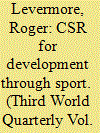

|
|
|
|
|
| Publication |
2010.
|
| Summary/Abstract |
Recent publications have highlighted the growth of sport as a vehicle in deploying corporate social responsibility (CSR) programmes or for disseminating international development initiatives. However, very little has been written on the considerable increase of the use of sport with corporate social responsibility to further social and economic development. This will expand as a range of CSR for development initiatives are being launched to coincide with mega-sports events in the coming years, starting with the 2010 football World Cup. This article addresses this gap by charting the ways in which sport is being used by businesses (ranging from multinational corporations to sports federations) as part of discrete development initiatives. It highlights the opportunities (notably developing partnerships and reaching those alienated from traditional development) and limitations associated with this. Limitations form around Stefano Ponte et al's typology of CSR initiatives, which is used to highlight the fact that many projects are poorly linked to core business objectives and are therefore less likely to be taken seriously and succeed. A lack of evaluation and the tarnished reputation of sport are other problems associated with CSR for development through sport.
|
|
|
|
|
|
|
|
|
|
|
|
|
|
|
|
| 4 |
ID:
095058
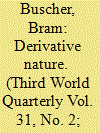

|
|
|
|
|
| Publication |
2010.
|
| Summary/Abstract |
Many conservationists nowadays talk about the urgent need to value nature. To bring out the 'true value' of nature and make conservation compatible with poverty reduction, so the argument goes, it must be appropriated into the realm of commodities and priced in monetary terms. By employing the concept of 'derivative nature', this paper explores the consequences of this neoliberal move. Derivatives are financial mechanisms whose monetary value is literally derived from the value of underlying assets. They were originally devised to reduce risk in the marketplace, but have actually made the global financial market immensely more complex and created more systemic risk and uncertainty because of their susceptibility to speculation. The paper suggests that similar processes can be seen in the arena of conservation. It argues that both nature and 'the poor' are increasingly becoming 'underlying assets' for what has become the 'real' source of value of neoliberal conservation, namely images and symbols within the realms of branding, public relations and marketing. Empirically grounded in a discussion on transfrontier conservation in Southern Africa in the run-up to the 2010 soccer World Cup, the paper examines the consequences of 'derivative nature' and calls for critical thinking to start facing these consequences.
|
|
|
|
|
|
|
|
|
|
|
|
|
|
|
|
| 5 |
ID:
095053
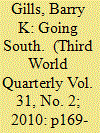

|
|
|
|
|
| Publication |
2010.
|
| Summary/Abstract |
This article argues that the current protracted and severe financial and economic crisis is only one aspect of a larger multidimensional set of simultaneous and interacting crises on a global scale. The article constructs an overarching framework of analysis of this unique conjecture of global crises. The three principal crisis aspects are: an economic crisis of (over) accumulation of capital; a world systemic crisis (which includes a global centre-shift in the locus of production, growth and capital accumulation), and a hegemonic transition (which implies long term changes in global governance structures and institutions); and a worldwide civilisational crisis, situated in the sociohistorical structure itself, encompassing a comprehensive environmental crisis and the consequences of a lack of correspondence and coherence in the material and ideational structures of world order. In these ways, the global system is now 'going south'. All three main aspects of the global crisis provoke and require commensurate radical social and political responses and self-protective measures, not only to restore systemic stability but to transform the world system.
|
|
|
|
|
|
|
|
|
|
|
|
|
|
|
|
| 6 |
ID:
095055
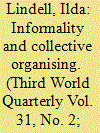

|
|
|
|
|
| Publication |
2010.
|
| Summary/Abstract |
This paper is a conceptual exploration of the dimensions of the contemporary politics of informal economies, from the vantage point of collective organising by 'informal workers'. It inquires into the formation of the political subjectivities and collective identities of informal actors. The importance of the relations between their organisations and other organised actors is illustrated with a discussion of emerging alliances with trade unions. The transnational scales of collective organising by 'informal workers' are addressed. The paper suggests an analytical approach that takes account of the diversity of organised actors, of a variety of governing powers and of the various spatial scales of social struggle involved in the politics of informal livelihoods today. The reflections are informed by the considerable social and economic differentiation contained in informal economies and emphasise the importance of the great diversity of actors, positions, agendas and identities for understanding the complex and contingent politics of informality. Empirical illustrations are drawn from the African continent, but the discussions in the paper address wider trends and theoretical debates of relevance for other developing regions.
|
|
|
|
|
|
|
|
|
|
|
|
|
|
|
|
| 7 |
ID:
095061


|
|
|
|
|
| Publication |
2010.
|
| Summary/Abstract |
The hegemony of globalisation has visited poverty, ecological destruction, illiteracy and sickness, on the marginalised and impoverished masses in Latin America, who have been powerless to advance or protect their well-being, and have reacted and protested against the local effects of global exploitation within social movements. However, the construction of an alternative existence in a globalised world requires the emergence of a regional, collective consciousness, and a commitment to addressing local needs. That such a consciousness is emerging is suggested by the sea-change in Latin American politics since Hugo Ch vez became president of Venezuela in 1998. A commitment to endogenous development and human need over corporate profits is being effected within the Bolivarian Alliance for the Peoples of Our America (ALBA). The epochal significance of ALBA is emphasised by posing an analogy between the narrative of Gabriel Garcia Marquez's novel Love in the Time of Cholera, where the transcendental power of love overcomes the oppressive forces of cholera and unrequited love, and the ALBA process of regional endogenous development promoting social improvisation to address the devastation of international competitive exchange.
|
|
|
|
|
|
|
|
|
|
|
|
|
|
|
|
| 8 |
ID:
095059
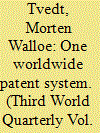

|
|
|
|
|
| Publication |
2010.
|
| Summary/Abstract |
This article offers a discussion of the probable effects of a Worldwide Patent System for developing countries. It draws upon insights from the ongoing processes in the World Intellectual Property Organization and elsewhere relevant for the global patent system and discusses these features from a developing country perspective. For scientifically advanced developing countries the effect in their most advanced and most global enterprises is potentially positive as they will benefit as much as other multinational companies. In areas of research and development where these most advanced developing countries do not possess a high level of technological capacity, a Worldwide Patent System is unlikely to create any benefits for them. For countries with the ability to copy and produce inventions made by others a Worldwide Patent System will have a negative effect as inventors will have little opportunity to utilise the system, whereas they will be bound by a larger number of exclusive rights narrowing down their space for innovation. For the least developed countries an additional problem arises: it might become even more difficult to import essential goods because patents will be in force in these countries even though there is no production of that product in the country.
|
|
|
|
|
|
|
|
|
|
|
|
|
|
|
|
| 9 |
ID:
095060
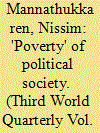

|
|
|
|
|
| Publication |
2010.
|
| Summary/Abstract |
Prominent postcolonial thinker Partha Chatterjee's concept of political society is an important one in understanding the vast domain of politics in the 'Third World' which falls outside hegemonic Western notions of the state and civil society. This domain, which is often marked by the stamp of illegality, nevertheless contributes to the immense democratic churning that characterises much of the 'Third World'. However, this paper argues that the series of binaries set up by Chatterjee, like modernity/democracy, civil society/political society and the privileging of the latter half of the binary is ultimately counterproductive to the goal of democratisation. Based on empirical research on the People's Plan Campaign in Kerala, one of the most extensive democratic decentralisation programmes in the world, it will argue that the extension of popular sovereignty requires that we go beyond political society. The failures and prospects of the Plan and the struggles around it demonstrate clearly the breakdown of the binary.
|
|
|
|
|
|
|
|
|
|
|
|
|
|
|
|
| 10 |
ID:
095054
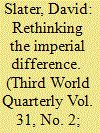

|
|
|
|
|
| Publication |
2010.
|
| Summary/Abstract |
In this article the imperial is envisaged in terms of a multifaceted terrain of analysis that can encourage us to pose a number of interrelated questions. Five issues are identified for discussion. First, the differential way cultural studies and Marxist political economy approaches interpret the imperial present is assessed. Second, the why and how of imperial power are subjected to debate. Third, the overlapping inside and outside of imperialism are identified and analysed. Fourth, the newness of today's 'new imperialism' is highlighted and critically examined and, fifth, in relation to the evolving geopolitics of knowledge, some reflections are offered on the significance of the imperial in global times. The context is predominantly provided by US-Latin American encounters.
|
|
|
|
|
|
|
|
|
|
|
|
|
|
|
|
|
|
|
|
|